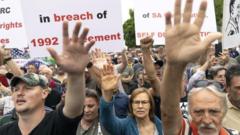A recent court ruling in South Africa has categorically rejected the notion of a "white genocide," deeming it imaginary and dismissing a wealthy benefactor's attempts to support a white supremacist organization.
Court Ruling Dismisses 'White Genocide' Claims as Fabricated

Court Ruling Dismisses 'White Genocide' Claims as Fabricated
South African court finds allegations of white genocide baseless, countering remarks from prominent US figures.
In a landmark decision, a South African court has thrown out claims surrounding a so-called "white genocide," labeling them as "clearly imagined" and “not real.” This ruling directly contradicted statements made by notable figures such as former US President Donald Trump and entrepreneur Elon Musk.
The court's decision came in response to an attempt by Grantland Michael Bray, who wished to donate $2.1 million to the Boerelegioen, a white supremacist group founded with the purported aim of defending the country's white minority population against imagined threats. However, the court deemed Bray's request ambiguous and contrary to public policy.
Trump has previously claimed there is a "large-scale killing of farmers" in South Africa, while Musk has condemned laws they described as racist. Trump has even suggested that white South African farmers facing persecution should be allowed refuge in the US. Musk, who was born in South Africa, has had extensive discussions surrounding these themes.
The court action was initiated by Bray’s siblings, who argued that their brother had developed a fixation on the idea of a looming genocide against white people during the last decade of his life. The judge's ruling highlighted how this anxiety was exacerbated by Bray's existing prejudices and the extremist online content he consumed.
Bray, who had previously experienced serious health issues due to a military accident, reportedly provided around $326,000 in financial support to the Boerelegioen after first encountering its members in 2020. The group declares itself a civil defense movement that opposes alleged threats to white citizens.
The court found Bray’s intent vague, as he did not specify which of the multiple entities representing Boerelegioen would receive his funds. Moreover, the judge stated that Bray aimed to support a group he believed would combat an imagined genocide, which is unsupported by evidence.
In response to public policy concerns, Bray's siblings conveyed that the funds would serve to propagate ideologies of racial hatred and separation. The Boerelegioen, on the other hand, maintains that their services are inclusive and available to all, irrespective of race.
Previously, Trump signed an executive order halting financial aid to South Africa due to new laws allowing the government to seize land under specific conditions - a move that has resonated with certain sections of the American political landscape.
Despite speculation regarding the plight of white South Africans, crime statistics indicate a different reality. While the government does not release crime data by race, recent reports identified approximately 6,953 murders in the country between October and December 2024, of which only a minor fraction occurred on farms.
This ruling has amplified discussions about racial dynamics and crime in South Africa, casting doubt on narratives propagated in certain political spheres, particularly concerning the safety of the white minority.
The court's decision came in response to an attempt by Grantland Michael Bray, who wished to donate $2.1 million to the Boerelegioen, a white supremacist group founded with the purported aim of defending the country's white minority population against imagined threats. However, the court deemed Bray's request ambiguous and contrary to public policy.
Trump has previously claimed there is a "large-scale killing of farmers" in South Africa, while Musk has condemned laws they described as racist. Trump has even suggested that white South African farmers facing persecution should be allowed refuge in the US. Musk, who was born in South Africa, has had extensive discussions surrounding these themes.
The court action was initiated by Bray’s siblings, who argued that their brother had developed a fixation on the idea of a looming genocide against white people during the last decade of his life. The judge's ruling highlighted how this anxiety was exacerbated by Bray's existing prejudices and the extremist online content he consumed.
Bray, who had previously experienced serious health issues due to a military accident, reportedly provided around $326,000 in financial support to the Boerelegioen after first encountering its members in 2020. The group declares itself a civil defense movement that opposes alleged threats to white citizens.
The court found Bray’s intent vague, as he did not specify which of the multiple entities representing Boerelegioen would receive his funds. Moreover, the judge stated that Bray aimed to support a group he believed would combat an imagined genocide, which is unsupported by evidence.
In response to public policy concerns, Bray's siblings conveyed that the funds would serve to propagate ideologies of racial hatred and separation. The Boerelegioen, on the other hand, maintains that their services are inclusive and available to all, irrespective of race.
Previously, Trump signed an executive order halting financial aid to South Africa due to new laws allowing the government to seize land under specific conditions - a move that has resonated with certain sections of the American political landscape.
Despite speculation regarding the plight of white South Africans, crime statistics indicate a different reality. While the government does not release crime data by race, recent reports identified approximately 6,953 murders in the country between October and December 2024, of which only a minor fraction occurred on farms.
This ruling has amplified discussions about racial dynamics and crime in South Africa, casting doubt on narratives propagated in certain political spheres, particularly concerning the safety of the white minority.





















